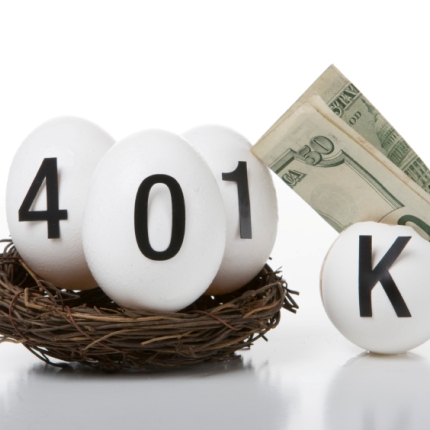Borrowing From Your 401(k) Is Easy. But Should You Really Break Open That Piggy Bank?
 The 401(k) is considered the cornerstone of retirement, but when times get tough, some people treat it like a piggy bank.
The 401(k) is considered the cornerstone of retirement, but when times get tough, some people treat it like a piggy bank.
Nearly 3 in 10 Americans dip into their retirement savings, according to Transamerica. The most common reasons include paying for higher education, dumping debt and footing the bill for unplanned medical expenses.
After all, life happens. That was the case for one married couple. In 2013, Ashley and Tyler Patrick of Charlotte, North Carolina, were pregnant with a second child, but their small, two-bedroom brick ranch-style home required a remodel.
“We needed to connect a separate in-law suite to the main house to make room for our newborn before her birth,” says Ashley, 34, a financial coach who runs budgetsmadeeasy.com.
Her husband, Tyler, 35, who works on an assembly line putting together different types of equipment, agrees. To pay for the home improvements, the Patricks took out a $25,000 loan from Tyler’s 401(k) account.
“It was a cheap way to borrow money,” says Ashley. “We had just purchased the house, so there was no real equity for the remodel.”
The funds reached their checking account quickly. Yet, it was a high price to pay.
“We were hit with a $6,500 tax bill,” says Ashley.
Most financial advisers tell clients to steer clear from taking money from your nest egg. If you decide to borrow from your 401(k), consider the pros and cons.
The Pros
The Process:
It’s often quick and less intensive than obtaining other types of credit.
“There’s no need for a credit check, underwriting, or lengthy application,” says Lauren Anastasio, CFP at SoFi, a personal finance company.
For Robert Barker, 43, a machinist in Shelby Township, Mich., the process was simple. He took a loan from his 401(k) in November 2016 to cover $3,500 in closing costs on a condo purchase.
“I was surprised how versatile and easy it was to take the loan out of my 401(k),” says Barker. “I even changed the term of the loan to make the payment more affordable.”
Barker spoke to a representative from his company to walk him through the process. Before making this type of commitment, talk to a financial professional to understand the specifics of the loan.
The Rate:
The average interest rate for a 401(k) loan is typically determined by your plan administrator, but it should be similar to what you might expect from a bank.
“Since the loan is backed by the investments in your 401(k), there is less risk to the lender and, in turn, the loan can be offered at a much cheaper interest rate,” says Anastasio.
The Repayment Terms:
Generally, you have up to five years to repay a 401(K) loan.
“However, for many plans, if the money is used to buy a home, the five-year repayment requirement is waived,” says Rob Drury, executive director, Association of Christian Financial Advisors in San Antonio.
Besides, payments are automatically deducted from your paycheck, which helps avoid the potential for late or forgotten payments, adds Anastasio.
The Cons
The Harsh Repayment Rule
If you leave your job, the outstanding balance of your loan has to typically be repaid in 60 or 90 days. The loan will be considered a distribution (aka income), and you pay taxes and a penalty on it, says Robert Farrington, creator of The College Investor, which gives personal finance advice. Per the IRS, “you may also have to pay an additional 10% tax on the amount of the taxable distribution, unless you are at least age 59½ or qualify for another exception.”
Here’s a teensy loophole from the Tax Cuts and Jobs Act: If you left your job in 2019, you don’t have to pay taxes or the penalty if you repay the loan in full or roll it over to another plan by April 15, 2020 (or Oct. 15, 2020, if you file an extension). In other words, the loan has to be paid in the same tax year in which you left your job. Check with your accountant to see if you can take advantage of this loophole while it lasts.
The Early-Withdrawal Penalty:
According to IRS regulations, there is a 10% penalty if you withdraw funds from your 401(K) before the age of 59½. Also, your plan provider has to withhold 20% for federal income taxes and 2% to 8% for state income taxes, depending on where you live.
The Tax Consequences:
“Since 401(k) loans are paid back with after-tax dollars, you are paying tax on that money twice – when it comes out of your paycheck to repay the loan, and when you withdraw the funds in retirement,” says Kyle Whipple, a financial adviser for the C. Curtis Financial Group, in Plymouth, Michigan.
The Lost Gains:
“You lose time and money on the growth of the borrowed amount, the loan payments are taking the place of previous contributions, meaning you lose the company match and your additions, and you lose money to the fees associated with the loan,” says Whipple. To minimize the hit to your long-term savings, keep contributing to your 401(k), so you can continue to receive any employer match, he says.
While taking a loan from your 401(k) isn’t ideal, it’s essential to understand the complete picture before deciding.
How You Could Endanger Your Own 401k
Source: USA Today


